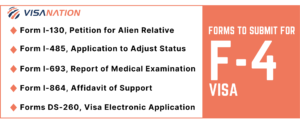You grew up with them, they played with you, they teased you, they protected you, and in your eyes, your siblings are immediate relatives. However, in the eyes of USCIS, a sibling green card falls under the family-sponsored preference category and not the immediate relative category. Because of this, the F4 visa, known as the sibling green card, takes significantly longer compared to immediate relative green cards in terms of processing time, forms, necessary documents, and who is allowed to sponsor them.
In this guide, learn how to best navigate and understand the F4 visa process.
Why wait? Start your sibling’s F4 application now!
Who is Eligible for the F4 Visa?
To qualify for an F4 sibling green card, you must meet the following requirements:
- The sponsoring sibling must hold U.S. citizenship;
- The sponsoring sibling must be at least 21 years old.
- The sibling receiving the green card must either be a full-blooded sibling, paternal half-sibling, step-sibling, or adopted sibling
- Permanent residents cannot sponsor siblings to live permanently in the country.
There are different types of required documentation for each type of sibling. We’ll go over more of the details for each type of category later.
Sponsor Requirements for an F4 Visa
The detailed sponsor requirements vary depending on the type of sibling you are sponsoring. To sponsor a full-blooded sibling, you must:
- Be a U.S. citizen;
- Be over the age of 21;
- Prove that the beneficiary is, in fact, your sibling, either with a birth certificate or other documents; and
- Be residing in the U.S.
However, the documents that you must submit will differ if your beneficiary is not a full-blooded sibling.
Adopted Siblings
To sponsor an adopted sibling, you must also submit a copy of the adoption decree that demonstrates that you and your adopted sibling were under 16 years old before the adoption took place.
It is important to note that if your full-blooded sibling was later adopted by another family, you can not sponsor that sibling for an F4 visa.
Step Siblings
To sponsor a step-sibling, you must provide a copy of your natural parent and step-parents’ marriage certificate and copies of any documents demonstrating that their prior marriages were terminated.
Half Siblings
To sponsor a half-sibling, you must provide a copy of each marriage certificate from each mother, along with copies of documents demonstrating the prior marriages were terminated.
-
A male U.S. citizen can petition only for those half-siblings who share his father.
-
A female U.S. citizen can petition only for those half-siblings who share her mother.
F4 Visa Fees
Sibling green card fees are generally around $1,300, not including the medical examination fee. Below is the breakdown of fees:
- I-130: $625 for online filing, $675 for paper filing
- DS-260 Immigrant Visa Application: $325 (if applying from outside the U.S.)
- I-864 Affidavit of Support: $120
- USCIS Immigrant Fee: $220
- Medical Examination: varies depending on where you live.
- If you are missing vaccines from the Department of State list, you will have to pay for these as well.
Fees for siblings already living in the U.S.
If your sibling lives in the U.S. under a valid nonimmigrant status such as an H-1B Visa, they will pay:
- I-130: $625 for online filing, 675 for paper filing
- I-485 Adjustment of Status: $1,440 (if applying from within the country under a nonimmigrant visa)
- USCIS Immigrant Fee: $220
F4 Visa Application Process
The F4 application process is usually completed by the sponsor and by the beneficiary sibling. Although the entire process may differ depending on your background, the general process is listed below:
- Sponsor completes I-130, Petition for Alien Relative;
- If USCIS approves the petition, then the application will be passed on to NVC for consular processing.
- NVC will send your foreign sibling an application package with detailed instructions and documents that must be submitted.
- The sibling must wait for the priority date to become current with the final action date in the Visa Bulletin
- The sibling will then have to submit all of the documents requested by the NVC and submit Form DS-260.
- The beneficiary will have to undergo a medical exam
- Attend the visa interview
- If approved, the foreign sibling will receive a package from NVC and will be granted entry to the U.S.
F4 Sibling Green Card Processing Time
The F4 sibling green card processing time for the I-130 Petition for Alien Relative takes approximately 17-23 years, depending on your country of origin. While most countries take around 16-17 years to process, countries like India and Mexico have longer wait times due to per-country visa limits and high demand.
This is just the first step in the process – afterward, the sibling must undergo consular processing (5-6 months) they live outside the U.S. or adjustment of status if they are on a valid nonimmigrant status in the U.S.
 Many people ask about the I-130 processing time for siblings. Since family-sponsored preference categories are not current in the Visa Bulletin, USCIS does not list a processing time for these categories. Instead, you should refer to the dates listed in the Department of State Visa Bulletin.
Many people ask about the I-130 processing time for siblings. Since family-sponsored preference categories are not current in the Visa Bulletin, USCIS does not list a processing time for these categories. Instead, you should refer to the dates listed in the Department of State Visa Bulletin.
You can check on your specific case status by inputting your receipt number in the USCIS’s case status checker.
Only 65,000 F4 visas are distributed every year, which also leads to long delays in approval. For the most accurate information on visa approvals, visit the visa bulletin.
Do you have questions related to family-based immigration? VisaNation can help you with the entire process, from start to finish. Start today!
Processing time: I-485 or Consular Processing
After the priority date is current, your sibling can file an I-485 adjustment of status, or their case will be forwarded to the Department of State for consular processing.
- I-485: Processing time for I-485 adjustment of status for a sibling will take approximately 8.2 months according to USCIS data (FY 2025), but typically ranges anywhere from 6-12 months.
- Consular processing: Consular processing for a sibling will take approximately 5-6 months, but may take longer due to lack of interview appointment availability.
- For scenarios where an individual will be applying within the U.S., they MUST maintain lawful status.
- The extreme difference in F2B, F3, and F4 depends on the individual’s country of birth (due to visa demand).
You could become our next success story. Read some of our family success stories!
Sibling Green Card Forms: I-130, I-485, I-693, I-864, DS-260, DS-261
Numerous forms must be submitted during the F4 process. Below is a detailed summary of all of the forms that you will encounter during the sponsorship process.

Form I-130, Petition for Alien Relative
Form I-130 is always required for any family-based green card petition. Only the U.S. citizen who is sponsoring the sibling can fill out and submit the form. The sibling is considered the beneficiary. When USCIS accepts and receives the I-130, it will assign a priority date to the petition.
You don’t need to fill out a separate I-130 for your sibling’s spouse or their unmarried children under 21 years old.
To fill out the I-130, be prepared to answer questions about the following topics:
- The type of relationship you have with your sibling
- Your biographical information, including:
- Address history
- Marriage status and information about your spouse and any past spouses
- Information about your parents
- Employment history
- Immigration status
- Ethnicity, race, weight, height, and eye and hair color
- Your sibling’s biographical information, including:
- Current name and any history of name changes
- Immigration information
- Current address
- Marriage status and information about his or her spouse and any past spouses
- Information regarding your sibling’s children
- Any history of entry to the U.S.
- Information about your sibling’s employment
- Your history of petitioning other relatives
- Your contact information
- The interpreter’s contact information, if one was used
- The contact information of the person who filled out the application, if one was used
Form I-485, Application to Register Permanent Residence or Adjust Status
If your sibling is already in the U.S. under a nonimmigrant visa, then they will be able to adjust their status to an immigrant green card by submitting Form I-485 once their F-4 priority date is current. Currently, there is an extended wait of 17-23 years for the F-4 priority date to become current from the time the I-130 is filed with USCIS.
It is important to note that if your sibling is in the country but not under a visa, then they will still need to proceed with their application as if they were outside of the country, including traveling to the home country to interview at the embassy or consulate when the priority date becomes current.
Your sibling is the only one who can fill out the I-485. They should be prepared to answer questions regarding the following topics:
- Basic information regarding name, past names, address information, and recent immigration information
- The visa category they are filing for
- Their address history and employment history
- Information about their parents
- Information about their current marital status and marital history
- Information about their children if they have any
- Information regarding any memberships they may have had to organizations, clubs, societies, associations, or similar while in the U.S.
- Criminal history
- Any security and espionage activity
- Information about the possibility of being a public charge
- Any immigration violations or removals
- Their contact information
- The interpreter’s contact information if one was used
- The contact information of the person who filled out the application if one was used
Form I-693, Report of Medical Examination and Vaccination Record
A USCIS-approved physician must perform a medical exam on your sibling for the F4 visa. Those results will come in a sealed envelope with your I-693.
If your sibling is in the U.S., they can find an approved physician at USCIS’ Find a Doctor tool. If your sibling is outside the country, they need to search for the U.S. embassy or consulate in their area, and review the instructions for the medical exam and the authorized practitioners.
The exam includes a physical and mental evaluation, drug and alcohol screening, medical history review, immunization records, and tests for different diseases and illnesses. The physician might refer your sibling to another physician for additional testing depending on their findings in the initial exam. I-693 is not complete and signed until all testing required by the approved physician is complete.
According to USCIS Policy, health-related conditions can make your sibling inadmissible for an F4 visa:
- Communicable disease of public health significance
- Failure to show proof of required vaccinations,
- Physical or mental disorder with associated harmful behavior, and
- Drug abuse or addiction.
Form I-864, Affidavit of Support
To demonstrate that you can support your sibling financially until they have found employment, you must submit Form I-864. In this form, you must demonstrate evidence of an annual income that is at least 125 percent of the Federal Poverty Guideline.
You need to be prepared to answer questions about the following topics:
- Basic name and address information for your sibling
- Your basic name and address information
- Your household size
- Your employment and income information
- Income information from anyone else in your household will be used to support your sibling
- Information about your assets if your income alone does not reach 125 percent of the Federal Poverty Guidelines. Alternatively, a joint sponsor can support your application.
Forms DS-260, Immigrant Visa Electronic Application
Once your I-130 is approved and the priority date becomes current, your sibling must submit DS-260, the online visa application. The application must be submitted with a copy of the I-864.
Discover why families trust us. See what our clients have to say.
Sibling Green Card Document Checklist
USCIS requires the following documents when petitioning for an F4 visa:
- A copy of your birth certificate and your sibling’s birth certificate to prove there is at least one parent in common.
- Any document that can prove your citizenship status, which can include copies of a U.S. birth certificate, passport, citizenship certificate, naturalization certificate, or a consular report of birth abroad.
- You must submit your most recent federal tax return and W-2s for Form I-864 Affidavit of Support. You should also submit any Form 1099 from the past three years, pay stubs from the past six months, a signed letter from your employer, or any other information about your reported income that may help you.
- For the medical exam, your sibling should bring a full copy of their medical history, vaccination and immunization records, copies of previous chest X-rays, and a treatment plan from their doctor for any health conditions.
- If your sibling is submitting an adjustment of status, they need a copy of the approval notice from the green card petition, their I-94 arrival/departure card, their I-797 approval notice from their previous nonimmigrant status, a copy of any Employment Authorization Documents, and the results of the medical examination from their original I-693. More documents may be required depending on what type of nonimmigrant visa your sibling holds.
- Two passport photographs
DNA evidence can be submitted if, for some reason, birth certificates are not available or USCIS determines them unreliable. Note that USCIS can suggest DNA testing, but does not have the authority to require testing.
F4 Visa Interview
After the National Visa Center (NVC) has all your documentation, they will schedule an interview with your sibling at the U.S. embassy or consulate in their country of residence. If your sibling has a spouse or children who will also be a part of the F4 visa, they must also complete DS-260, do a medical exam, and attend the interview.
The purpose of the interview is to determine if your sibling is eligible for the F4 visa and whether all the documentation provided is accurate. The interviewer will also ask your sibling questions regarding his or her background.
Your sibling must also bring documents to the interview, including photographs and original or copies of all provided civil documents submitted to the National Visa Center. Your sibling must not forget to bring any of these documents.
What to Do If Your Sibling is Denied an F4 Visa
If your sibling falls under any of the following grounds of inadmissibility, among other reasons—they will be denied a sibling green card:
- Criminal grounds
- Security and espionage grounds
- Health-related grounds
- Being considered a public charge
- Violating immigration Law
- Being ineligible for citizenship
- Previous removal
- Fraud
Some of these grounds can be waived. However, the following grounds cannot:
- Drug addiction or abuse
- Drug trafficking
- Those found to be spies
- Involvement in terrorism
What to Do If Your Sibling Is Approved for an F4 Visa
Once your sibling is approved for an F4 visa, the first thing to do is celebrate. Then your sibling will receive the visa stamped in his or her passport along with a sealed packet with a letter stapled to it. Your sibling should verify the information on the visa and the letter is correct. The packet must be submitted unopened to an immigration officer at a port-of-entry.










